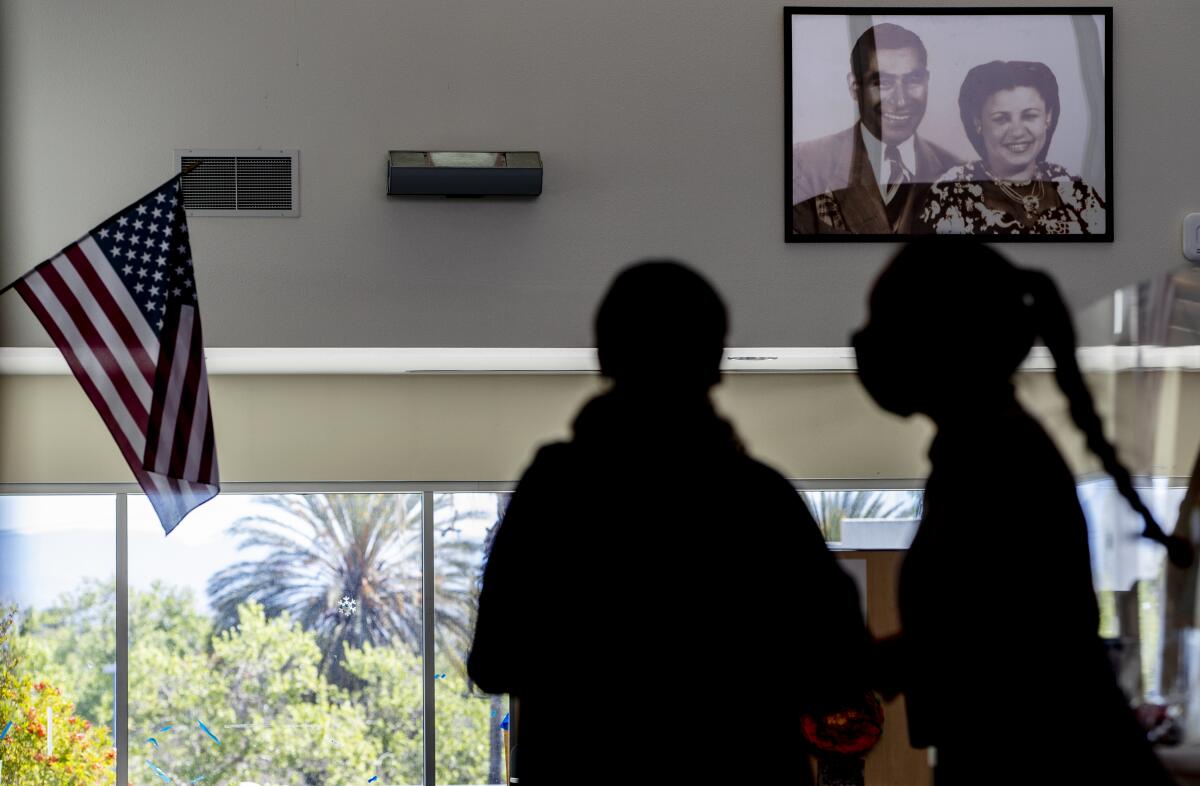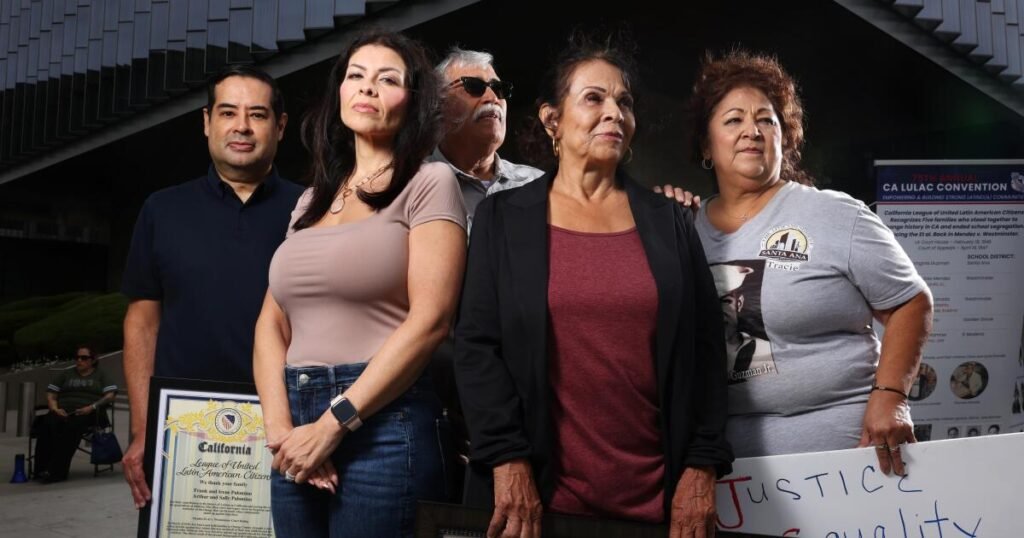The 14 people who gathered on the steps of the First Avenue federal courthouse in downtown Los Angeles a few Saturdays ago were passionate, but their cause seemed a little vague.
Men, women and children of all ages, with French bulldogs in tow, held signs that read “Five Families, Four School Districts,” “Speak Up,” and “Excluded Plaintiffs.” They held up banners with photos of their relatives and shouted “Equality!” through megaphones at disinterested pedestrians and motorists.
Another sign — which read “HR 5754” next to a crossed-out emoji — was similarly incomprehensible to almost everyone.
At one time, five families — Estrada, Guzman, Mendez, Palomino and Ramirez — were united in their determination to overturn school segregation in Orange County.
They sued four Orange County school districts in 1946 and won a far-reaching victory that not only allowed local Latino students to attend the same schools as their white classmates, but also promoted desegregation in schools throughout California and was a precursor to Brown v. Board of Education.
The case was heard in the old federal courthouse on Spring Street. In September, Los Angeles Democratic Assemblyman Jimmy Gomez proposed naming the new courthouse on 1st Street after Felicitas and Gonzalo Mendez, hence the bill number HR 5754.
“This court will remind us that history and the law are not shaped only by judges,” Gomez said in a speech on the House floor last month, “but by those with the courage to challenge unjust laws and make our country better.”
HR 5754 passed and is now before the Senate. If enacted, the bill would make the Los Angeles federal court the first to be named for a Latino and would be the latest victory in the historic recovery project of the past 25 years that has brought the class action lawsuit, Mendez et al. v. Westminster School District of Orange County et al., out of the so-called shadows.
It has been commemorated in documentaries, plays, books, academic articles, exhibits, and even postage stamps, and a bill requiring its inclusion in the California education curriculum passed unanimously in the state Assembly and Senate.
Gomez's efforts to celebrate the Mendezzes and their place in history seem like the type of heartwarming story the country needs more of right now. Who could disagree?
The remaining four families.
They want the court’s name to include them, or at least include “et al.”
“It's just four little letters. Is it really that hard?” Mike Ramirez, whose parents, Lorenzo and Josefina, sued the current Orange Unified School District, said at the protest.
Unfortunately, it's very difficult: Federal courts can only be named after cities or people, not after legal cases.
“It makes me angry,” added Beverly Guzman Gallegos, 74, whose grandparents, William and Virginia Guzman, sued the Santa Ana Unified School District. She held a framed letter signed by Barack Obama, thanking her family for their role in the landmark civil rights case.
“These five families were fighting together then,” said Tammy Guzman, 50, of West Covina. She is married to Amanda Guzman, William and Virginia's great-granddaughter. “But 75 years later, we're fighting for inclusion again, this time against one family. I don't understand.”
“It's really that simple,” Ramirez responded. “People pick up on the soundbites, the loud ones get attention, and history begins from there.”
Paul Granado plays harmonica on the steps of the 1st Avenue Federal Courthouse in downtown Los Angeles to protest a proposal to rename the courthouse after Gonzalo and Felicitas Mendez, whose lawsuits helped desegregate California schools. Four other families from the lawsuit also oppose the measure.
(Christina House/Los Angeles Times)
The feud between the Mendez family and four other families dates back decades, and the four families argue that historians and the media have focused almost exclusively on the Mendez family's contributions to the case for which it is best known, beginning with the abbreviated title that follows legal citation protocol: “Mendez v. Westminster.”
They have pressured reporters and scholars to add “et al.”, but most of their anger is directed at Mendes' daughter, Silvia.
A recipient of the Presidential Medal of Freedom in 2011, she has traveled the country telling her story of how she was forced to attend a rundown, all-Mexican school far from home while her lighter-skinned cousins attended nearby white schools. And the other four families? They claim she acknowledges their existence but provides few details.
Public schools named for Gonzalo, Felicitas and Sylvia exist from Santa Ana to Boyle Heights to Berkeley and even North Carolina. The only other family memorials in the city are a library at Santiago Canyon College named for Lorenzo Ramirez and a ceremonial street sign honoring William and Virginia Guzman, which the Santa Ana City Council unanimously approved earlier this week.
I've had a front-row seat to this fight in the 15 years since I wrote about it at length. I've watched as descendants of four families were barred from events commemorating their relatives' contributions to the civil rights movement because organizers feared what they might say. I've had to cut them off mid-presentation when their comments about being relegated to a historical footnote became so personal.
On the day of the protest, I had to correct them again: they first appeared at the courthouse where their desegregation lawsuit was heard so long ago, not the new courthouse named after Gonzalo and Felicitas Mendez. At the time, OC did not have its own federal courthouse, so the family traveled to Los Angeles for their court hearing.
Their rant may sound like sour grapes from history, but the blunders of Mendez and others touch on an important point: For too long, American history has been driven by the Great Man theory, which attributes great feats to brave individuals who fought off those who hated them and doubted them, rather than to large groups of people.
“This is one of the most frustrating historical events for me,” said Luis F. Fernandez, a history professor at Chaffee College, who conducted oral history research with members of all but the Mendez family, and whose students, Mike Ramirez and Beverly Guzman Gallegos, spoke to his class. “This should be a history of unity, a history of strength and organization about how we overcame structures that systematically kept Mexican American students out of our education. The status quo is a history of choice, of selection.”
“I don't even call [focusing on the Mendez contribution] “history” professional “At this point, that's a story,” he added.
Fernandez has approached politicians like Gomez and Sen. Alex Padilla, D-Calif., to urge the four families to come up with a strategy, and he thinks the families should stop calling themselves “the Others.”
“Nobody knows what it means,” he said. “It's like a tongue twister. Introduce yourself as a family member and get your name recognized.”

A photo of Gonzalez and Felicita Mendez hangs in the library at Mendez Middle School in Santa Ana.
(Gina Ferrazzi/Los Angeles Times)
Silvia Mendez did not respond to multiple requests for comment directly and through friends.
“Naming this courthouse will further inscribe in the national conscience a core piece of American civil rights history that has long remained unknown to many,” a Gomez spokesperson wrote to me in an email. The congressman “proudly lists” the names of the Estrada, Guzman, Ramirez and Palomino families alongside those of the Mendez family “every time he tells this story publicly,” the email continued.
For four families, that wasn't enough, and they held a short but heartfelt protest at the First Avenue courthouse.
“I felt insulted” by Gomez's claim, said Connie Pimentel Reagins, 44, of Murrieta. She is the great-granddaughter of Tomas and Maria Luisa Estrada, relatives of Mendez who sued the Westminster School District.
“This is unfair and inaccurate,” said Andrew Palomino, 53, the grandson of Frank and Eileen Palomino, who sued the Garden Grove Unified School District.
Nearby, Beverly's niece, Tracy Guzman, 59, held up her cell phone. NBC News article on proposed courthouse name changeOnly the Méndez family is mentioned; both the reporter and Sylvia lump together the donations of the Estradas, Guzmans, Palominos, and Ramirez families under the phrase “four other families.”
“It's always about one family,” Tracy said, shaking her head in disgust, “The Mendez family don't care. They're doing just fine on their own. They don't need us.”
















